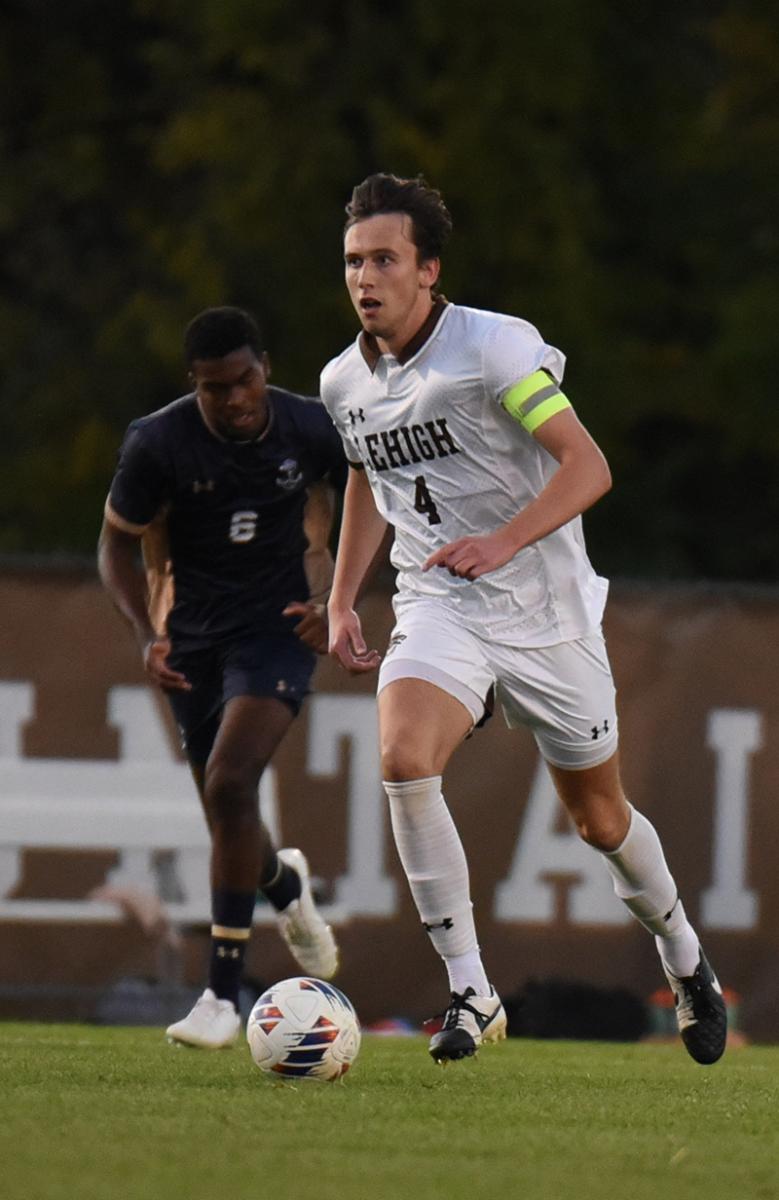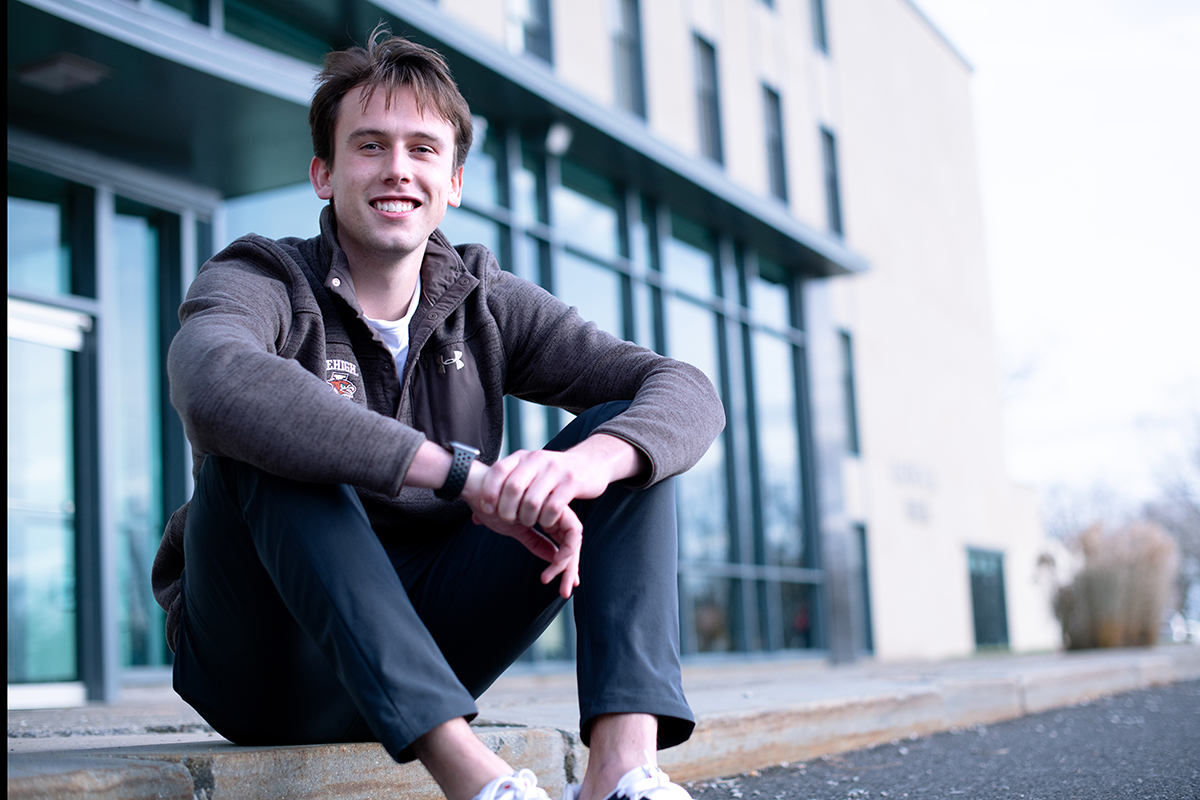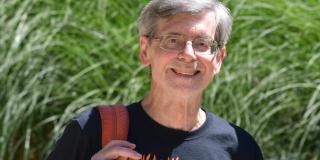Euan Forrest ’23 combines dual majors with soccer to create a fully rounded Lehigh experience
Choosing Lehigh was a no-brainer for Euan Forrest ’23.
“First, I knew that Lehigh would give me the opportunity to academically pursue everything that I was interested in and set me up for success upon graduation,” he says. “Secondly, I was recruited by the Lehigh soccer coaches during my junior year of high school to come play NCAA Division 1 soccer, which was very exciting for me. Finally, I have family connections to Lehigh, so I was already very familiar with our beautiful campus and everything Lehigh has to offer.”
A native of Douglassville, Pa., Forrest knew he wanted to pursue a pre-med track and was drawn to the biological sciences department and its behavioral neuroscience major.
“I was intrigued by the ability to study a specific aspect of human behavior and physiology, and I really enjoy investigating the beautifully intricate inner-workings of the brain on a daily basis,” he says.
After being accepted to Lehigh, Forrest was invited to participate in the Eckardt Scholars program.
“Being part of this program has been an amazing experience for me, filled with great peers and advisers, and it has allowed me to concentrate on the courses that I really want to focus on while being able to forgo [distribution] requirements,” he adds. “The program also provides funding upon request for research and travel opportunities that complement my degrees.”
The Eckardt Scholars program provides students with the opportunities to create a personalized curriculum that best suits their academic interests and ambitions, and Forrest paired his neuroscience coursework with a second major in economics.
“At first glance, behavioral neuroscience and economics seem completely unrelated, but I think the two of them perfectly complement each other in many ways,” he says. “I get the opportunity to study the brain and human behavior from both a scientific and social standpoint to figure out what makes us all do what we do. Additionally, I hope to attend medical school in the near future, and the intersection between economics and health care is becoming increasingly more apparent each day, especially after the COVID-19 pandemic.”
Eckardt Scholars complete a capstone project during their senior year, so for his thesis project, Forrest knew he wanted to do something that fully encapsulated both degrees. Working with senior executives at Thomas Jefferson University Hospital in Philadelphia, he is undertaking a cost-benefit analysis of the various methods by which hospitals obtain the pharmaceuticals they use. By assessing approaches such as in-house production and ordering from third-party suppliers, he hopes to model the most cost-efficient way for hospitals to obtain these medicines. These cost savings would then be able to benefit other aspects of the hospital, such as optimizing patient experiences, he notes.
Forrest balanced this effort with research experience in the electrophysiological neuroscience laboratory of neuroscientist Julie Haas. Haas, an associate professor of biological sciences, studies synapses in the thalamic reticular nucleus (TRN), which plays important roles in controlling the flow of information through the thalamus, a region in the brain regarded as one of the main sensory regulators impacting attention, sleep and even seizure activity. The TRN is primarily composed of inhibitory neurons that regulate information as it is passed through the brain and plays important roles in sleep cycles and attention. Impairments in these neurons have also been linked to absence seizures. The Haas lab explores specific electrical relationships between neurons in the TRN that can affect the speed and manner in which this information is transferred. He was involved in experiments to characterize a synaptic connection between the TRN in the thalamus and the basolateral amygdala (BLA).
“BLA is widely regarded as the brain region responsible for assigning positive or negative emotional valence to a certain sensory stimulus, and we wanted to study the details of this connection and how it affects the brain’s attentional weighting to potentially negative (fearful or harmful) stimuli. My role in these experiments focuses on stereotactic surgical injections of an optogenetic virus into the BLA of mice that allows us to image these synapses and affect their activity using a light stimulus,” he says. “I am so grateful for the opportunity to be a part of this lab, as it has allowed me to expand my scientific inquiry skills while learning new research techniques under great mentorship.”
 In addition to his academic pursuits, Forrest is the captain of the Lehigh men’s soccer team. Born in England and moving to the United States at a young age, he says soccer was always part of his family’s life.
In addition to his academic pursuits, Forrest is the captain of the Lehigh men’s soccer team. Born in England and moving to the United States at a young age, he says soccer was always part of his family’s life.
“My dad played professionally in England many years ago, and my two older brothers were both soccer players themselves,” he says. “My older brother, Mark, also played soccer at Lehigh before me and then went on to play professionally himself, so that was a huge factor in my decision to play here and follow in his footsteps. I had a great relationship with Lehigh’s coaching staff during my recruiting process, and they showed really high interest in me as a player and person, so my decision to play soccer at Lehigh was pretty straightforward in the end.”
Balancing school, research and sports has come with its challenges, he says.
“There have been a few times where it has felt like it might all be too much, but it has taught me amazing time management and prioritization skills,” he says. “My biggest takeaway from balancing different aspects of my life is to set aside time for each one when necessary and go all in ... don’t try to go back and forth.”
With plans to graduate this coming May, Forrest is looking forward to his next set of challenges and opportunities. He is currently in the process of studying for the MCAT with plans to apply to medical school next summer. He says he hopes to spend next year gaining further experience in clinical and research settings before matriculating to medical school in the summer of 2024.
Whether in class or in the lab, he concentrates on being fully present. When at practice or playing a game, he focuses on nothing but soccer. He lets nothing distract him from doing homework or studying.
“By dividing my responsibilities up like this,” Forrest says, “it has allowed me to fully embrace each one and give each my best performance.”







